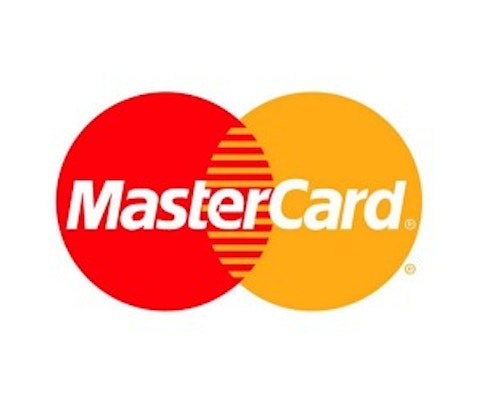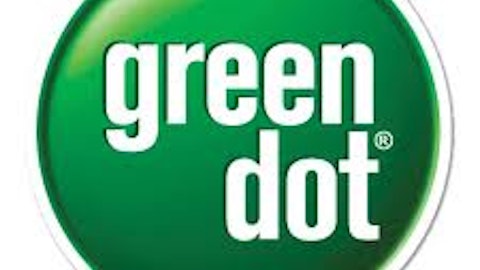Mastercard Inc (NYSE:MA)’s long-term investors must be quite happy. The stock has experienced a decent gain since its IPO, from around $47 per share in 2006 to more than $610.60 per share at the time of writing. Including the dividend payment, the cumulative return for shareholders has reached more than 1,260%. Is MasterCard still a good long-term buy for investors? Let’s take a closer look.
Growing second-quarter operating performance

Diluted EPS experienced year-over-year growth of 25.4%, higher than net income growth. The higher EPS growth was due to share-buyback activities in the past 12 months, which effectively reduced the share count from 126 million in the second quarter of 2012 to 122 million in this year’s second quarter.
What makes me like the business is its non-leveraged operations. As of June, Mastercard Inc (NYSE:MA) booked more than $7 billion in equity, nearly $2.3 billion in cash, $2.7 billion in investment securities but no interest-bearing debt. MasterCard is the second-largest global payment company, with $2.4 trillion in total payment volume and more than 1 billion cards issued in 2012, just behind Visa Inc (NYSE:V). Visa is really a global leader, with around $3.8 billion in total payment volume and around 2.1 billion cards issued. American Express Company (NYSE:AXP) ranked third, with $808 billion in total payment volume and 97 million cards issued in 2012.
The second-largest global payment company
However, investors should know the differences between Visa Inc (NYSE:V), Mastercard Inc (NYSE:MA) and American Express Company (NYSE:AXP)’ business models. Visa and MasterCard are only the intermediaries between merchants, banks and consumers; they do not directly provide loans for their users, whereas American Express is the financial provider for the card users. Visa and MasterCard only charge fees on transactions, so investors do not have to worry about those two companies’ credit risks. American Express, on the other hand, bears the credit risks with the loans to its card users.
In the next three years, Mastercard Inc (NYSE:MA) expects to grow its revenue by 11% to 14% annually, with an operating margin of at least 50%. The EPS growth rate is estimated to stay at least 20%. MasterCard has a total market cap of $74.2 billion. The market values MasterCard quite expensively, at more than 20.2 times its forward earnings. MasterCard offers investors quite a low dividend yield, at only 0.4%, with a low payout ratio of 7%.
The most expensive with the highest profitability
Compared to Visa and American Express, Mastercard Inc (NYSE:MA) has the highest valuation. Visa is trading at $177 per share, with the total market cap of around $114.2 billion. The market values Visa a bit cheaper, at 19.9 times its forward earnings. For the full year 2013, Visa expects to deliver 13% annual growth in revenue, while client incentives might stay in the range of 16% to 17% of the gross revenue.
With less than $1 billion in marketing expenses, Visa’s annual operating margin might come in at around 60%. The annual free cash flow is estimated to be about $6 billion. Visa pays a higher percentage of earnings in dividends. Its payout ratio is 15%, with the dividend yield is only 0.7%.
American Express is the cheapest valued among the three. At $73.80 per share, it is worth around $80 billion in market capitalization. The market values American Express at 13.8 times its forward earnings. American Express’ long-term financial targets were 8% or more in revenue growth, 12% to 15% in EPS growth and 25% or more in ROE. In the past 12 months, American Express’ ROE stayed at nearly 23.9% while the return on invested capital was nearly 4%. American Express offers the highest dividend yield at 1.2%, with the payout ratio at 20%.
MasterCard seems to deserve the highest valuation because of its highest profitability level. In the past 12 months, its return on invested capital was the highest of the trio, at 43.1%, while Visa’s ROIC was much lower, at 20.5%.
Business expansion
For the card-issuing business, it’s all about the network. Both Visa and MasterCard have been competing with each other vigorously to expand their business footprints in new markets. Visa has come to Africa with the payment network in Rwanda, while MasterCard was the first credit-card company to enter the Myanmar market. Those two companies also try to grow their businesses alongside the rising trend of online shopping demand. Visa has V.me, the digital wallet service with more than 50 additional financial-institution partners, while MasterCard partners with ING for the testing of the new EMV Internet Payments using mobile phones.
Indeed, Visa and MasterCard are the two best stocks for the fast-growing cashless transaction trends despite their current high valuations. I like MasterCard more, due to its much higher profitability, the opportunity to expand the business outside of the U.S., and the growing network with banks and merchants.
My Foolish take
MasterCard could be a decent long-term pick for patient shareholders. With a extremely high profitability, a global leading position and a growing operating performance, MasterCard could deliver nice returns for shareholders for a very long period of time.
Anh HOANG has no position in any stocks mentioned. The Motley Fool recommends American Express, MasterCard, and Visa. The Motley Fool owns shares of MasterCard.
The article A Global Card Issuer for Long-Term Shareholders originally appeared on Fool.com and is written by Anh HOANG.
Anh is a member of The Motley Fool Blog Network — entries represent the personal opinion of the blogger and are not formally edited.
Copyright © 1995 – 2013 The Motley Fool, LLC. All rights reserved. The Motley Fool has a disclosure policy.


